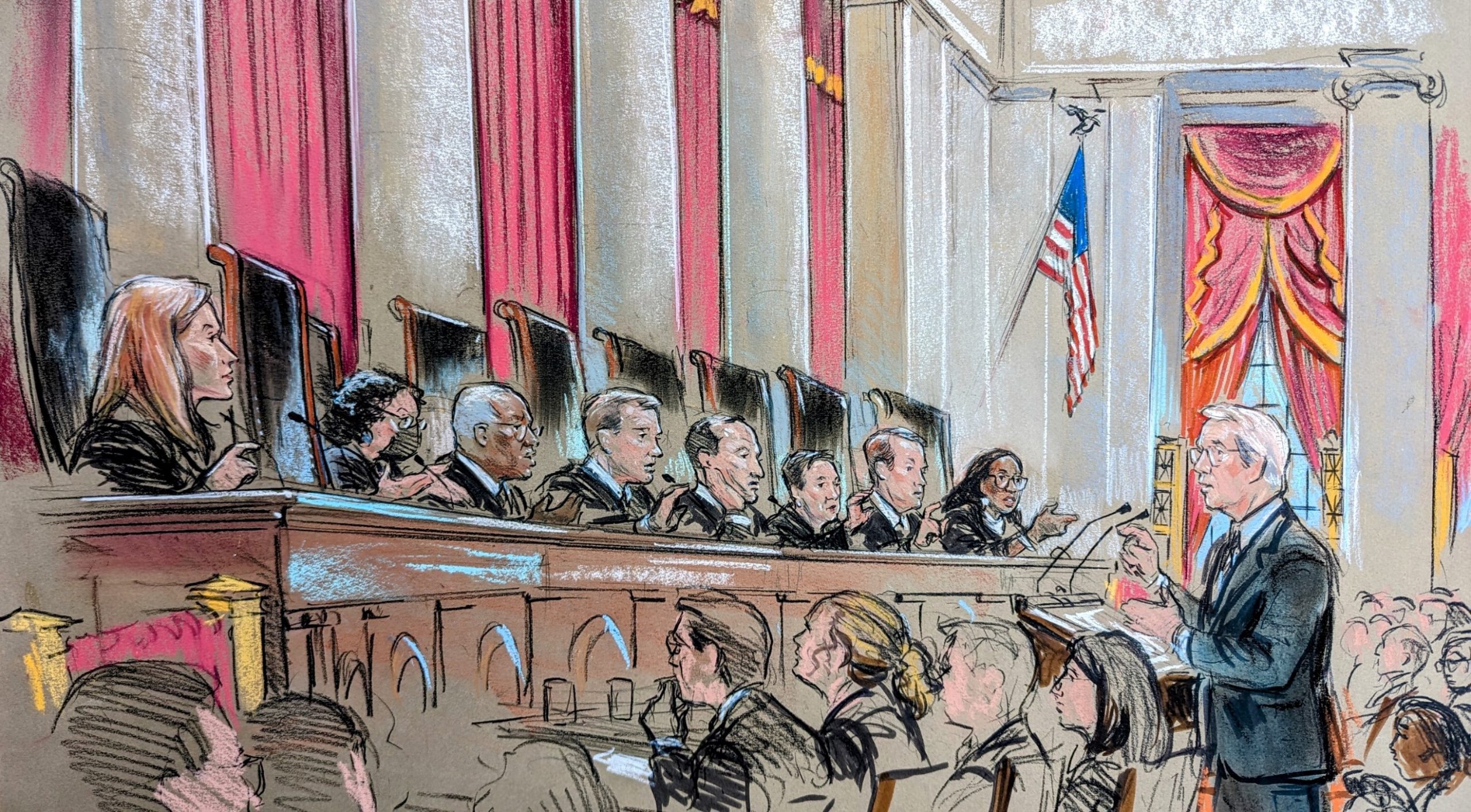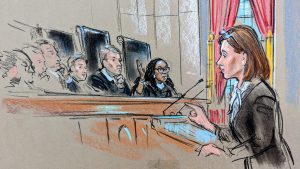TOPIC ANALYSIS
By Amy Howe
on February 21, 2023
at 4.31pm

Eric Schnapper argues before the judges for the Gonzalez family. Justice Neil Gorsuch was “under the weather” and participated in the argument from a distance. (William Hennessy)
The Supreme Court on Tuesday debated the scope of a 27-year-old federal law that protects social media companies from liability for content posted by others. In question in González vs. Google it’s whether section 230 of the Communications Decency Act protects internet platforms when their algorithms target users and recommend someone else’s content. Google and its backers warned in legal filings that a ruling against them could massively reshape legal liability for tech companies across the county, but after nearly three hours of discussions Tuesday, judges appeared wary of taking such a significant step.
The case was brought by the family of Nohemi Gonzalez, a 23-year-old American woman who was studying in Paris when she was killed in an ISIS attack in 2015. Their lawsuit alleges that Google, which owns YouTube, violated the Antiterrorism Acts prohibition on aiding and abetting terrorism by recommending (among other things) ISIS videos to users through its algorithms, thereby aiding ISIS recruitment.
Representing the Gonzalez family, law professor Eric Schnapper told the justices that Section 230 distinguishes between claims that seek to hold internet companies accountable for content created by someone else and claims that seek to hold internet companies accountable for their own conduct. Whether an Internet company’s recommendations fall into the latter category will depend on whether they meet specific criteria outlined in the Section 230 text, Schnapper said. But he faced a barrage of questions from judges across the ideological spectrum.
Judge Clarence Thomas has written skeptically about the broad immunity under Section 230 in recent years, but has appeared surprisingly sympathetic to the theory behind the US Court of Appeals for the 9th Circuit in ruling in Google’s favor that Section 230 protects recommendations as long as the provider’s algorithm treats the content on its website similarly. If the same algorithm that recommends ISIS videos based on a user’s history and interests also recommends cooking videos to someone who is interested in cooking, Thomas asked, how can Google be held accountable for those recommendations?
Judge Neil Gorsuch, however, was skeptical of what he dubbed the Ninth Circuit Neutral Instruments Test. Such a test is nowhere in Section 230, he noted, and he rejected the notion that algorithms are necessarily neutral. In his view, the court should refer the case back to the lower court for further consideration. Gorsuch joined the discussion by telephone; he was feeling a little down in the dumps, according to a court spokesman.

Lisa Blatt argues on behalf of Google. (William Hennessy)
Representing Google, attorney Lisa Blatt told the judges that Section 230 provides immunity from claims that treat the defendant as a publisher. All posting, Blatt continued, requires organization just as Google does with its YouTube recommendations. Helping users find the proverbial needle in a haystack is an existential necessity on the Internet, Blatt concluded.
Judge Ketanji Brown Jackson was perhaps most squarely in the Gonzalez family corner. Under Section 230, he told Blatt, Congress was trying to protect Internet platforms that were blocking and screening offensive materials. However, Jackson continued, you are arguing here that Section 230 protects platforms that promote offensive material. How, Jackson asked Blatt, is she even conceptually consistent with what Congress intended?
Justices Elena Kagan suggested that even if Section 230 isn’t fit to meet the current needs of today’s Internet, that task is better left to Congress, rather than the Supreme Court. These aren’t, like, the nine biggest pundits on the internet, Kagan noted.
Kavanaugh echoed Kagan’s sentiment. She noted that Congress included broad language in Section 230 and that the courts have unanimously interpreted that text to provide protection for behaviors like YouTube. The friend of the court’s briefs in support of Google warned of serious problems, including economic dislocation, if that understanding is upset, she noted. Is the Supreme Court, you asked, really the best institution to make these kinds of decisions?
And Judge Amy Coney Barrett has suggested that the judges may not have to decide the matter before them at all. The judges will hear the argument on Wednesday Twitter versus Taamneh, a related case brought against Twitter by the family of a Jordanian citizen killed in an ISIS attack at an Istanbul nightclub. Like the Gonzalez family, the Taamneh family filed suit under the Antiterrorism Act, but unlike the Google case, immunity under Section 230 is not before the courts. If you lose tomorrow, Barrett asked Schnapper, who also represents the Taamneh family, do we get to the Section 230 question?
Schnapper declined to concede the point. While Google may try to dismiss the case, he acknowledged, the Gonzalez family would have the right to try to amend the complaint…to meet any standard you set in the Twitter case.
A decision on the case is expected by the summer.
This article was originally published in Howe on the Court.
#biggest #pundits #internet #Judges #wary #sweeping #Section #ruling #SCOTUSblog
Image Source : www.scotusblog.com
